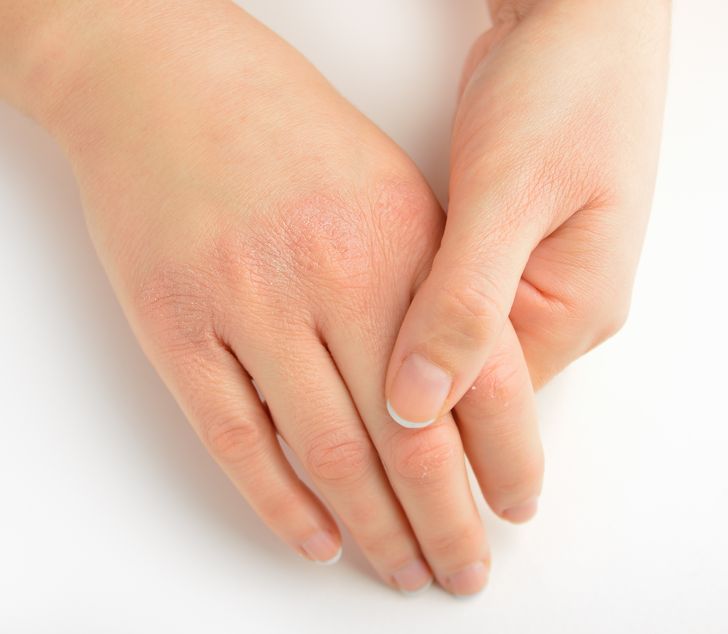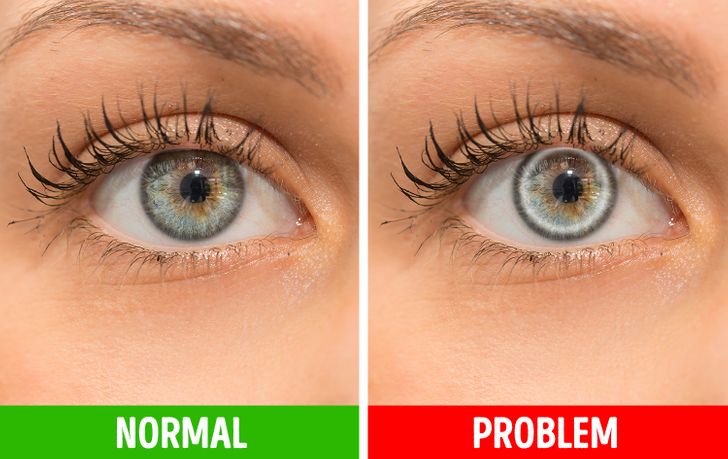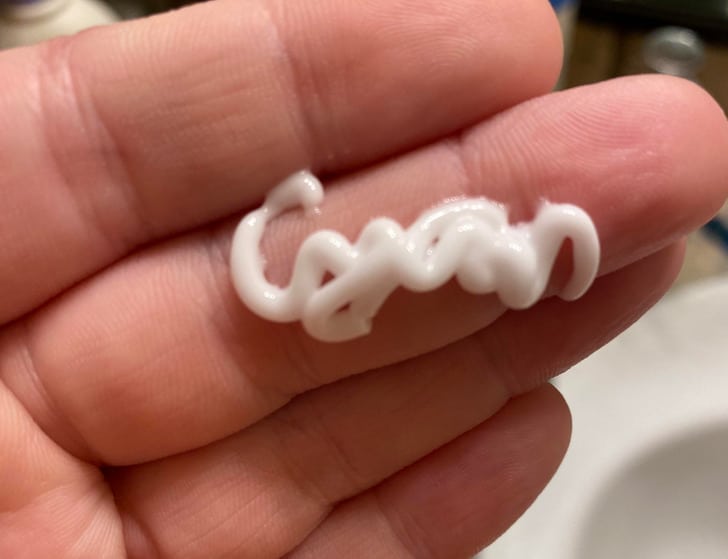According to specialists, a persistent urge to chew ice or consume salty foods could indicate underlying issues or deficiencies in minerals and vitamins. Therefore, it’s essential to be attentive to any new habits that emerge suddenly and unexpectedly.
In pursuit of promoting a long and joyful life, we have compiled a list of signals your body may be sending you. By paying heed to these messages, you can take proactive steps towards improved well-being and overall health.
Persistent crawling or creeping feeling in the legs:
If you experience unusual sensations like crawling or the urge to move your legs, especially at night, it might be a symptom of restless leg syndrome, a long-term disorder affecting sleep.

Thickened and itchy skin:
Thickening and itching of the skin could indicate various internal issues such as hormonal disorders, eczema, or allergies. It’s essential to seek medical attention and consider blood tests if the problem persists or worsens.

Changes in handwriting, loss of smell, and intense dreams:
Symptoms like tremors, slow movement, poor sleep, nightmares, and changes in speech and writing might be signs of Parkinson’s disease. It’s crucial to consult a doctor if these symptoms are observed.

Anger and aggressive behavior:
Researchers suggest that bursts of anger may be connected to depression. Aggressive behavior can be one of the manifestations of depression, along with low energy and sadness.

Excessive sleeping (hypersomnia):
Hypersomnia, or excessive sleeping, may be caused by various factors beyond tiredness. Some autoimmune diseases and alcohol consumption before sleep can lead to this condition.

Changes in eye color:
A white or grey ring around the cornea of the eyes, particularly in people under 45, may be a sign of high cholesterol.

Intense salt cravings:
Intense cravings for salty food may indicate iron deficiency, anemia, dehydration, or premenstrual syndrome, according to medical sources.

Forgetfulness, fatigue, and low libido:
These symptoms may be confused with depression, but they could signify an underlying thyroid hormone issue, which may also cause weight gain and sensitivity to cold.

Constant thirst:
Feeling thirsty all the time is not normal and could be a sign of various conditions, including diabetes or pregnancy. It’s essential to seek medical evaluation to identify the cause.

Desire to chew ice:
Craving ice might be more than just a habit; it could be linked to iron deficiency or anemia, requiring further evaluation through blood tests and potential supplementation.
Please note that the information provided here is for educational purposes only and not a substitute for professional medical advice. If you experience any of these symptoms or have concerns about your health, consult a qualified healthcare provider for proper evaluation and treatment.

50 Signs Indicating Potential Health Issues
- Persistent Fatigue and Weakness: Feeling tired and weak most of the time, even after ample rest, could signal an underlying health problem, such as anemia or thyroid issues.
- Unexplained Weight Loss or Gain: Sudden and unexplained changes in body weight might be linked to metabolic disorders, hormonal imbalances, or gastrointestinal issues.
- Frequent and Unexplained Headaches: Regular headaches, especially when accompanied by other symptoms, might be related to migraines, tension headaches, or more severe conditions.

- Persistent Joint or Muscle Pain: Chronic pain in the joints or muscles could be indicative of conditions like arthritis, fibromyalgia, or autoimmune disorders.
- Changes in Appetite or Eating Habits: Drastic changes in appetite, including excessive hunger or loss of appetite, may be linked to various medical conditions or emotional factors.
- Difficulty Sleeping or Sudden Changes in Sleep Patterns: Insomnia, sleep apnea, or sleep disturbances might affect overall health and require evaluation.

- Persistent Digestive Issues: Frequent bloating, diarrhea, constipation, or stomach discomfort may indicate digestive disorders or food intolerances.
- Unexplained Changes in Skin: Skin issues like rashes, redness, itching, or sudden changes in moles should not be ignored and may warrant a medical examination.
- Chronic Cough or Shortness of Breath: Persistent cough or difficulty breathing could be signs of respiratory conditions, allergies, or lung diseases.
- Sudden Changes in Vision or Eye Health: Blurry vision, eye pain, or sudden vision loss may signal eye conditions or neurological issues.

- Frequent Bruising or Bleeding: Easy bruising or unexplained bleeding could be related to clotting disorders or underlying health concerns.
- Abnormal Menstrual Cycles: Irregular periods or severe menstrual pain might indicate hormonal imbalances or gynecological conditions.
- Intense Mood Swings or Emotional Changes: Drastic shifts in mood or emotional instability may be linked to mental health disorders or hormonal fluctuations.
- Chronic Allergies or Sensitivities: Frequent allergic reactions or sensitivities to certain substances may require allergy testing or medical evaluation.

- Changes in Hair Health: Sudden hair loss, thinning, or changes in hair texture might be connected to nutritional deficiencies or hormonal imbalances.
- Frequent Infections or Slow Recovery: Frequent infections and delayed recovery from illnesses might suggest a weakened immune system.
- Persistent Fevers: Prolonged and unexplained fever could be a sign of infection or inflammation.
- Unexplained Swelling: Swelling in different body parts without an apparent cause requires investigation to rule out potential underlying issues.

- Difficulty Concentrating or Memory Issues: Trouble focusing or memory problems might indicate stress, sleep issues, or neurological conditions.
- Unquenchable Thirst: Constant thirst could be a symptom of diabetes, hormonal imbalances, or dehydration.
- Unexplained Itchiness or Hives: Persistent itchiness or hives might be related to allergies, skin conditions, or stress.
- Frequent Urination: Frequent trips to the bathroom without increased fluid intake might be a sign of urinary tract infections or diabetes.

- Persistent Back Pain: Chronic back pain may indicate spinal issues, musculoskeletal problems, or kidney problems.
- Persistent Heartburn or Acid Reflux: Frequent heartburn could be linked to gastroesophageal reflux disease (GERD) or stomach ulcers.
- Unexplained Swollen Lymph Nodes: Enlarged lymph nodes might be a response to infection or a sign of an underlying health condition.
- Sudden and Unexplained Dizziness: Dizziness or lightheadedness may be related to inner ear problems, low blood pressure, or other medical conditions.

- Frequent Nausea or Vomiting: Frequent or persistent nausea and vomiting may indicate gastrointestinal issues or infections.
- Severe Abdominal Pain: Intense and unexplained abdominal pain could signal appendicitis, gallstones, or other gastrointestinal problems.
- Difficulty Swallowing: Trouble swallowing might be linked to throat or esophageal issues that require medical attention.
- Persistent Sore Throat: Chronic sore throat may be a symptom of infections, allergies, or acid reflux.
- Chest Discomfort or Tightness: Chest pain or pressure could be related to heart problems or other cardiovascular conditions.
- Unexplained High Blood Pressure: Consistently elevated blood pressure levels might be a sign of hypertension or other cardiovascular issues.
- Persistent Frequent Urination: Frequent urination might be related to urinary tract infections or bladder problems.
- Severe Shortness of Breath: Difficulty breathing, especially when accompanied by chest pain, may indicate serious respiratory or cardiac issues.
- Sudden and Unexplained Weight in the Abdomen: Rapid abdominal weight gain may be a sign of fluid retention or other health problems.

- Excessive Sweating: Unusual or excessive sweating, particularly at night, may be associated with various medical conditions.
- Persistent Fatigue After Exertion: Feeling extremely tired after minimal physical activity might be a sign of chronic fatigue syndrome or anemia.
- Unexplained High Blood Sugar Levels: Consistently high blood sugar levels might indicate diabetes or insulin resistance.
- Sudden Changes in Nail Health: Changes in nail color, texture, or shape could be indicative of nutritional deficiencies or underlying health conditions.
- Sudden and Unexplained Changes in Taste or Smell: A sudden loss or distortion of taste and smell might be related to sinus issues or infections.
- Sudden Changes in Bowel Habits: Drastic changes in bowel movements might be linked to gastrointestinal disorders or inflammatory conditions.
- Persistent Canker Sores: Frequent and recurring canker sores may be a sign of weakened immunity or other health issues.
- Persistent Ear Pain or Ringing: Chronic ear pain or ringing in the ears could be related to ear infections or hearing problems.
- Unexplained Chest Palpitations: Irregular or rapid heartbeats might be indicative of cardiac arrhythmias or heart conditions.
- Sudden and Unexplained Muscle Weakness: Sudden weakness in muscles may be associated with neurological disorders or other medical conditions.

- Frequent Skin Infections: Frequent skin infections might indicate compromised immunity or underlying skin conditions.
- Sudden and Unexplained Changes in Breast Tissue: Unexplained breast lumps or changes in breast appearance should be evaluated by a healthcare professional.
- Persistent Jaw Pain or Clicking: Chronic jaw pain or clicking might be a symptom of temporomandibular joint (TMJ) disorder.
- Unexplained Chills or Night Sweats: Recurring chills or night sweats may indicate infections or other underlying health issues.
- Changes in Gum Health: Changes in gum color, swelling, or bleeding might be related to gum disease or other dental problems.
It’s important to remember that this list is not exhaustive, and individual symptoms should be evaluated by a qualified healthcare professional to determine the cause and appropriate treatment. If you experience any of these signs or symptoms, seeking medical advice promptly can help identify potential health concerns and ensure timely interventions.
If you experience any of these signs or symptoms, it’s crucial to consult a healthcare professional promptly for a thorough evaluation and appropriate medical advice. Early detection and intervention can help address potential health concerns and improve overall well-being.

